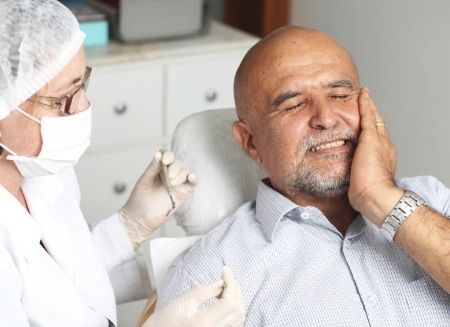Emergency Dentist – Sachse, TX
Fast, Effective Treatment When You Need It Most

If you or one of your family members are experiencing a dental emergency, call Sachse Family Dentistry at Woodbridge right away. Our priorities are to ensure your safety, get you free from pain, and restore your smile. In most cases, we’re able to see patients on the same day they call. However, if for any reason we’re unable to schedule a visit right away, our emergency dentist in Sachse, Dr. Rottman, will take the time to walk you through first-aid and pain management tips over the phone. Our team is always here to provide fast and effective treatment when you need it most, so give us a call today!
Why Choose Sachse Family Dentistry at Woodbridge for Emergency Dentistry?
- Same-Day Appointments for Emergency Patients
- Sedation Dentistry Options Available
- Your Dental Insurance Benefits Maximized
What to Do in a Dental Emergency

- Call our office right away. We’ll work quickly to get you scheduled that very same day, even on Saturdays. Over the phone, we’ll provide first-aid instructions to help you manage the situation while you wait for your appointment.
- Have an emergency exam. At our office, Dr. Rottman will perform an emergency exam and take X-rays to identify the source of your symptoms. Based on his findings, he’ll create a custom treatment plan to get your smile back on the right track.
- Get the care you need. During your appointment, we may be able to temporarily relieve your pain. However, you may need to return for additional treatment to fully address the emergency. Some common services for hurting teeth include fillings, crowns, root canal treatment, or tooth extraction.
The Most Common Dental Emergencies
Although each dental emergency is unique, smile-related injuries often fall into two categories: those that stem from long-term issues (like an oral infection) and those that stem from sudden trauma (like an accidental elbow to your mouth). In both cases, contacting our team is a top priority. However, there are a few measures you can take at home to stabilize your condition until your appointment. Click on the icons below to learn how to handle a few common dental emergencies!
Understanding the Cost of Emergency Dentistry

Depending on the root of the issue, the cost of emergency dental treatment can vary. For that reason, we cannot provide you with an estimate of the price here. Don’t worry, though – that doesn’t mean we will leave you in the dark about something so important. We will always perform a detailed exam, discuss your options, and provide you with the estimated cost upfront. In the meantime, you can read on to learn more, including the factors that play a role in the cost!
Why Every Dental Emergency is Different
Before we can provide you with an estimate of the price, we need to determine the type of dental injury you’ve sustained, the severity of the damage, and the restorative treatment (or combination of treatments) you need to have a healthy, pain-free smile again. Once we have all of this information, we can discuss the cost and review the financial solutions available. Simply put, we never want cost to be the reason you miss out on the quality dental care you need, so we will go the extra mile to make navigating the financial side of your treatment easy.
Does Dental Insurance Cover Dental Emergencies?
In addition to covering 100% of preventive care, 80% of minor restorative services, and 50% of major restorative treatments, many dental insurance plans cover the cost of an emergency exam each year. So, if you have dental insurance, it’s important to review the fine print on your plan – it could help you save! If you need any help, you’re more than welcome to ask us for assistance since we work with many of the nation’s leading providers, including Aetna, Delta Dental, and Cigna.
Other Options for Making Dental Emergencies Affordable
Not all patients have dental insurance, which is why we’re proud to offer several additional payment options, including:
- Our Smile Advantage Plan – Joining gives you immediate access to several benefits, including a 20% discount on services completed at our office.
- Flexible Financing – With trusted third-party financiers, like CareCredit, you can break up the cost of your care into smaller, more budget-friendly chunks.
- Our Special Offers – Our periodic specials help you save while maintaining, restoring, and enhancing your smile.
Remember, Taking Care of Your Smile Can Save You Money
All too often, patients downplay the importance of preventive care. The truth is that healthy habits, like brushing and flossing consistently, dramatically reduce your risk of dental trouble. So, if you aren’t already, start prioritizing your oral health!
It’s also important to note that your biannual dental visits play a crucial role in protecting your smile from harm. So, make sure to come to our office every six months for a checkup and cleaning. If you start to experience abnormal symptoms, like considerable sensitivity, then schedule an appointment with our emergency dentist in Sachse right away.
Keys to Preventing Dental Emergencies

Although dental emergencies aren’t entirely preventable, implementing the best practices below can significantly reduce your likelihood of experiencing one. Brushing and flossing are key as well as maintaining checkups, but they certainly aren’t the only tips to keep in mind. In between your visits to our office, make sure you always have these points in the back of your mind during your day-to-day. By doing so, you can prevent most dental emergencies and save on restorative and urgent dental treatments.
Visit Your Dentist Routinely for Checkups
Visiting our team every six months for a dental checkup and cleaning keeps your mouth free of harmful plaque and tartar. This is done through a comprehensive cleaning that lets us reach areas of the mouth often missed when cleaning teeth at home. Additionally, a detailed exam will give us the chance to confirm if any underlying issues are present, such as early signs of gum disease and cavities, two issues that usually fly under the radar until it’s too late.
Maintain Good Oral Hygiene Habits Every Day
Brush your teeth for two minutes at least twice a day and be sure to treat flossing as important as brushing. Both are needed to get plaque off of teeth and the gums in between your professional cleanings. Brush for at least two minutes at a time and use fluoridated toothpaste, which is proven to reduce the risk of cavities. For an added layer of protection, add an oral rinse to your routine as well. Waterpiks can also help to loosen food debris from between teeth.
Be Mindful of What You Eat
Eating certain foods can put your teeth at a much higher risk for cavities. While this includes foods and beverages containing lots of sugar, it also includes very acidic items. These ingredients essentially burn through enamel over enough time, weakening them and making them more likely to experience sensitivity. For that reason, you’ll need to make sure your diet also consists of fruits and vegetables as well as plain water throughout the day.
Wear a Mouthguard to Protect Yourself
Even with the best at-home oral hygiene, you aren’t fully protected if you play contact sports without a dedicated mouthguard. Furthermore, if you grind and clench your teeth while you sleep, a nightguard is the only way to protect yourself right at this moment. Our office can design and create a custom solution that fits your smile better than any mass-produced product at your local pharmacy or sporting goods store.
Avoid Habits That Harm Your Teeth
Avoid poor dental habits, like smoking and using your teeth as tools. Not only does smoking make your breath smell terrible, but it contributes heavily to oral health problems down the road, especially gum disease. Using your teeth to perform tasks like opening packages or bottles will only cause you to chip or crack your tooth. Use the right tool for the job instead. If you have a habit of biting on pens and pencils or chewing on ice, find a replacement so you don’t put your smile at risk.
Dental Emergency FAQs
If you’ve never experienced a dental emergency before, we can assure you that you are far from the only one. Most people don’t think they’ll ever have to deal with a dental emergency; until it occurs that is! In the event you aren’t sure what next steps to take, or you have a specific question regarding your situation, we encourage you to give our most frequently asked questions a look below. Is your question or concern not mentioned? Don’t hesitate to give us a call, especially if it’s urgent!
Do I Need to Visit for Minor Chips to Teeth?
If a tooth is damaged in some way, whether it’s chipped, cracked, or fractured, it will not grow back in any way whatsoever. In fact, it’s only more likely to break down further if it’s already broken. Depending on the type of break that has occurred, there are multiple treatment options available to you. If the tooth is sharp or jagged, get to our dental office as soon as you can to prevent cuts or lacerations to your cheek or tongue. However, if the chip appears to only be cosmetic, is not sharp, and does not hurt, you can probably afford to wait until regular business hours to have it addressed by our team.
Is My Tooth Pain from An Infection?
A sore or throbbing tooth is likely due to infection, but that’s not always the case. For this reason, you should take the time to consider if other symptoms are present as well. For example, if you have chronic bad breath, tooth sensitivity, red or swollen gums, or a draining sore on the gum tissue near the tooth in question, it’s much more likely that you are dealing with a dental infection. Problems like these are considered dental emergencies and need professional intervention to handle. Of course, you’ll only know for sure if it’s an infection by getting X-rays and an exam done at a dental office.
What Should I Keep in My Emergency Dentistry Kit?
Dental emergencies can appear at any moment, which is why it pays to be prepared. Having the resources at your disposal ahead of time can make it much easier to mitigate damage caused by a dental emergency, whether you live alone or take care of a family. Just a few items we recommend in your dental emergency kit include:
- Floss
- Anti-inflammatories (i.e., ibuprofen)
- Denture adhesive
- Dental cement
- Small storage container for teeth
- Sterile gloves
- Cotton balls
- Ice pack
- Contact information for our dental office
- Topical anesthetic
Can The Emergency Room Remove a Tooth?
Licensed dentists are the only professionals that are certified to legally perform tooth extractions. This means that someone who is performing a tooth extraction without the right training and credentials is likely breaking the law. Most emergency rooms do not employ dentists, so it’s extremely unlikely they will be able to perform this treatment. At best, they will provide you with painkillers and antibiotics if they believe you have a dental infection. For this reason, you make time to visit our dental office to address the root cause of your dental emergency.
